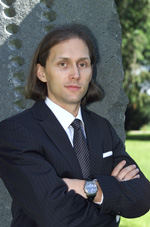 „EU Projekte geben uns die Möglichkeit neue Technologien international zu testen und sie somit konkurrenzfähig zu machen. Österreich alleine wäre viel zu klein, um alle erforderlichen wissenschaftlichen Experimente durchzuführen. Allerdings kommen wir bei der Produktentwicklung wieder zurück. Diese wird nur in unseren Hauptstandorten in Graz und Schiedlberg durchgeführt.“
„EU Projekte geben uns die Möglichkeit neue Technologien international zu testen und sie somit konkurrenzfähig zu machen. Österreich alleine wäre viel zu klein, um alle erforderlichen wissenschaftlichen Experimente durchzuführen. Allerdings kommen wir bei der Produktentwicklung wieder zurück. Diese wird nur in unseren Hauptstandorten in Graz und Schiedlberg durchgeführt.“
Kurzbiographie Dr. Christoph Guger
Dr. Christoph Guger studied biomedical engineering at the University of Technology Graz and Johns Hopkins University in Baltimore, USA. Then he carried out research work at the Department of Medical Informatics (Prof. Pfurtscheller) at the University of Technology Graz and received his PhD degree in 1999. The topic of his PhD work was the design of an EEG-based brain-computer interface. This was the first real-time BCI system with continuous feedback. He also developed the real-time analysis with common spatial patterns which is still the fastest and most accurate approach for oscillatory BCIs and developed also a P300 BCI with very high accuracy and speed. He is co-founder of g.tec where he works since 1999. The company develops hardware and software for biosignal acquisition and analysis (mainly EEG and ECG). Currently, g.tec is selling biomedical equipment in more than 60 different countries worldwide together with distribution partners in 20 countries and is the main worldwide supplier of brain-computer interface technology. The g.tec technology received several innovation Awards from 2000-2011 (Fast Forward Award, GEWINN-Award, European Information and Communication Technology price (ICT-price), Well-Tech Award, Econovius, Microsoft Award and Pegasus).
Currently g.tec has research funding from national (FFF, SFG) and European programs: Presenccia, Better, BrainAble, Vere, SM4all, Decoder, ALIAS, Rehabilitation Gaming System, Central Nervous System Imaging, High Profile, ECoG. Within the research projects invasive and non-invasive recording systems for brain activity are developed.
